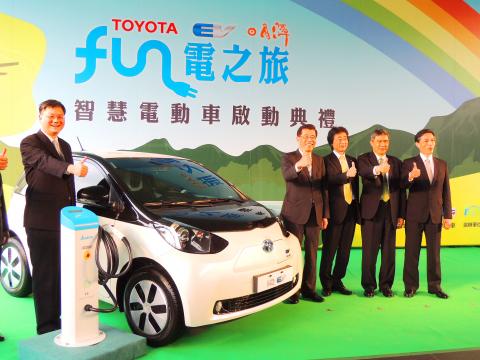PC vendor Asustek Computer Inc (華碩) and its subsidiary Unimax Computer (宇碩) yesterday introduced Android-powered GPS units in Toyota vehicles in collaboration with Hotai Motor Corp (和泰汽車) for tourists in Nantou County.
Running on Nvidia Corp’s Tegra 3 chip, the 7-inch GPS units integrate vehicles’ embedded multimedia devices and Asustek’s cloud-computing automobile guidance systems that operate automatically when the cars are started.
A total of 35 Toyota energy-saving vehicles, including 19 electric cars and 16 Prius hybrids, are available from tomorrow for tourists traveling around Sun Moon Lake (日月潭) to rent from local branches of Hotai Leasing Corp (和運租車).

Photo: Yang Ya-min, Taipei Times
“Asustek aims to develop products not only related to 3C [computers, communications and consumer electronics], but also 5C, which includes cars and cloud computing technologies,” Kent Chien (簡孝堅), general manager of the multimedia business unit at Asustek, said on the sidelines of the launch ceremony.
“As energy-efficient products become more popular in the market, we foresee integration between products, services and technologies will generate a certain amount of market value in the future. There is huge room for the vehicle market to fulfill its growth potential,” he added.
Asustek said the new products are similar to the company's smaller-sized tablets, but installed in vehicles. The company said it expects to receive orders for the GPS units by the end of the year, if the market reaction is better than forecast.
The GPS units are designed to function like tourist guides, Chien said, adding that the products display residual battery life, the location of charging stations, information about famous sites in the area and broadcast Internet radio programs from all over the world.
To provide tourists with safe and convenient battery charging services, Delta Electronics Inc (台達電), the nation’s largest power supply unit maker, yesterday said at the ceremony that it has installed 32 7-kilowatt alternating-current and 50-kilowatt direct-current charging machines at 28 charging stations around Sun Moon Lake.

WEAKER ACTIVITY: The sharpest deterioration was seen in the electronics and optical components sector, with the production index falling 13.2 points to 44.5 Taiwan’s manufacturing sector last month contracted for a second consecutive month, with the purchasing managers’ index (PMI) slipping to 48, reflecting ongoing caution over trade uncertainties, the Chung-Hua Institution for Economic Research (CIER, 中華經濟研究院) said yesterday. The decline reflects growing caution among companies amid uncertainty surrounding US tariffs, semiconductor duties and automotive import levies, and it is also likely linked to fading front-loading activity, CIER president Lien Hsien-ming (連賢明) said. “Some clients have started shifting orders to Southeast Asian countries where tariff regimes are already clear,” Lien told a news conference. Firms across the supply chain are also lowering stock levels to mitigate

IN THE AIR: While most companies said they were committed to North American operations, some added that production and costs would depend on the outcome of a US trade probe Leading local contract electronics makers Wistron Corp (緯創), Quanta Computer Inc (廣達), Inventec Corp (英業達) and Compal Electronics Inc (仁寶) are to maintain their North American expansion plans, despite Washington’s 20 percent tariff on Taiwanese goods. Wistron said it has long maintained a presence in the US, while distributing production across Taiwan, North America, Southeast Asia and Europe. The company is in talks with customers to align capacity with their site preferences, a company official told the Taipei Times by telephone on Friday. The company is still in talks with clients over who would bear the tariff costs, with the outcome pending further

Six Taiwanese companies, including contract chipmaker Taiwan Semiconductor Manufacturing Co (TSMC, 台積電), made the 2025 Fortune Global 500 list of the world’s largest firms by revenue. In a report published by New York-based Fortune magazine on Tuesday, Hon Hai Precision Industry Co (鴻海精密), also known as Foxconn Technology Group (富士康科技集團), ranked highest among Taiwanese firms, placing 28th with revenue of US$213.69 billion. Up 60 spots from last year, TSMC rose to No. 126 with US$90.16 billion in revenue, followed by Quanta Computer Inc (廣達) at 348th, Pegatron Corp (和碩) at 461st, CPC Corp, Taiwan (台灣中油) at 494th and Wistron Corp (緯創) at

NEGOTIATIONS: Semiconductors play an outsized role in Taiwan’s industrial and economic development and are a major driver of the Taiwan-US trade imbalance With US President Donald Trump threatening to impose tariffs on semiconductors, Taiwan is expected to face a significant challenge, as information and communications technology (ICT) products account for more than 70 percent of its exports to the US, Chung-Hua Institution for Economic Research (CIER, 中華經濟研究院) president Lien Hsien-ming (連賢明) said on Friday. Compared with other countries, semiconductors play a disproportionately large role in Taiwan’s industrial and economic development, Lien said. As the sixth-largest contributor to the US trade deficit, Taiwan recorded a US$73.9 billion trade surplus with the US last year — up from US$47.8 billion in 2023 — driven by strong